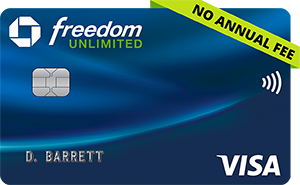The Chase 5/24 Rule for Your Chase Freedom Unlimited® Application
Accurate as of: November 16, 2025
When applying for a credit card from Chase, you must understand one of the industry's most widely known and restrictive application rules: the 5/24 rule. Understanding this rule is critical to a successful application for the popular Chase Freedom Unlimited® card.
Affiliate Disclosure: We are a professional review site that receives compensation from the companies whose products we review and recommend. If you apply for a credit card through our links (even indirectly through our affiliate partners), we may earn a commission. We are independently owned, and the opinions expressed here are our own.
What is the Chase 5/24 Rule?
The 5/24 rule is an internal policy at Chase that typically results in an automatic denial if you have opened five or more new credit card accounts (from any bank, not just Chase) in the last 24 months.Why the 5/24 Rule Matters for the Freedom Unlimited®
The Chase Freedom Unlimited® is subject to the 5/24 rule.If you are a high-volume applicant who has opened six cards in the last two years, you will almost certainly be denied the Freedom Unlimited® card. It doesn't matter if you have a perfect credit score or a long history as a loyal Chase customer; the rule is a hard cutoff for most applicants.
How to Check Your 5/24 Status
The best way to determine if you are 5/24 is to check your credit reports from all three major bureaus (Experian, Equifax, TransUnion) and manually count how many new accounts have a recent open date.Summary: The Golden Rule of Chase Applications
The Chase 5/24 rule is the single most important factor when applying for the Chase Freedom Unlimited® card. To maximize your approval odds, ensure you are below the 5/24 threshold before submitting your application.For a full guide on the card’s benefits, rewards, and application process, view our main guide: Chase Freedom Unlimited® Review: $0 Annual Fee and Strong Cash Back Rewards.
Ready to apply?
Chase Freedom Unlimited®

- Intro Offer: Earn a $200 Bonus after you spend $500 on purchases in your first 3 months from account opening
- Enjoy 5% cash back on travel purchased through Chase Travel℠, our premier rewards program that lets you redeem rewards for cash back, travel, gift cards and more; 3% cash back on drugstore purchases and dining at restaurants, including takeout and eligible delivery service, and 1.5% on all other purchases.
- No minimum to redeem for cash back. You can choose to receive a statement credit or direct deposit into most U.S. checking and savings accounts. Cash Back rewards do not expire as long as your account is open!
- Enjoy 0% Intro APR for 15 months from account opening on purchases and balance transfers, then a variable APR of 18.24% - 27.74%.
- No annual fee – You won't have to pay an annual fee for all the great features that come with your Freedom Unlimited® card
- Keep tabs on your credit health, Chase Credit Journey helps you monitor your credit with free access to your latest score, alerts, and more.
- Member FDIC
See Card Terms and Conditions
Found this guide helpful? Bookmark it for future reference as you continue your financial journey!
Experian Boost: A Comprehensive Guide to Boosting Your Free Credit Score
FICO® Credit Scores
FICO® Score Ranges:
- Exceptional: 800–850
- Very Good: 740–799
- Good: 670–739
- Fair: 580–669
- Poor: 300–579
What is a Credit Score?
A credit score is a three-digit number, typically ranging from 300 to 850, that predicts your creditworthiness—how likely you are to repay borrowed money on time. Lenders use this score to assess the risk of lending to you and to determine the interest rates and terms of any credit you might receive.
Why is a Credit Score Important?
A credit score is important because it acts as your financial reputation. Lenders, landlords, insurers, and employers use this single number to quickly judge how reliable you are with money. A higher score helps you qualify for loans and credit cards, often securing lower interest rates that can save you significant money. Conversely, a poor credit score can lead to application denials or much higher costs for borrowing, making it a key factor in your overall financial opportunities.
FICO® Credit Score Facts
- Three-Digit Number: Like other credit scores, FICO® Scores are a three-digit number that summarizes a consumer's credit risk.
- Range: Most standard FICO® Scores range from 300 to 850. Higher scores indicate lower credit risk.
- Data Source: FICO® Scores are calculated using data from your credit reports maintained by the three major credit bureaus: Experian, Equifax, and TransUnion. Your score may vary slightly depending on which bureau's data is used.
- Industry Standard: Lenders rely on FICO® Scores for mortgages, auto loans, and credit cards because they provide a consistent, statistically sound assessment of the likelihood that a borrower will repay their debt.
Note: Credit scores are used to represent the creditworthiness of a person and may be one indicator to the credit type you are eligible for. However, credit score alone does not guarantee or imply approval for any credit card product.
